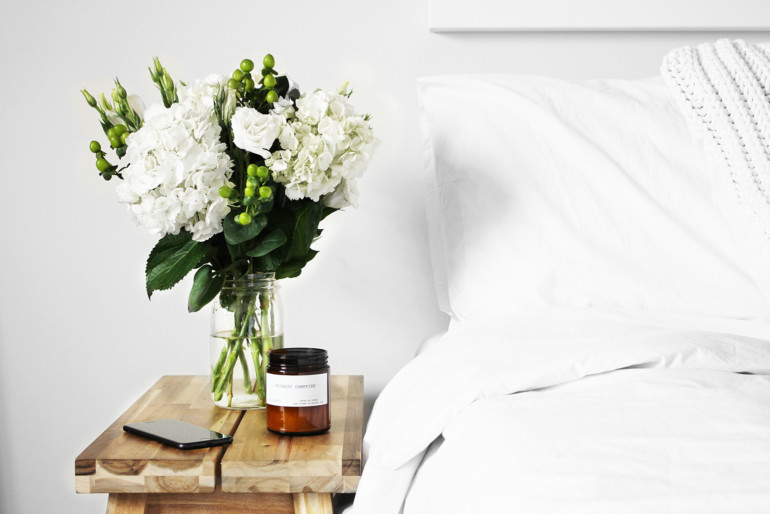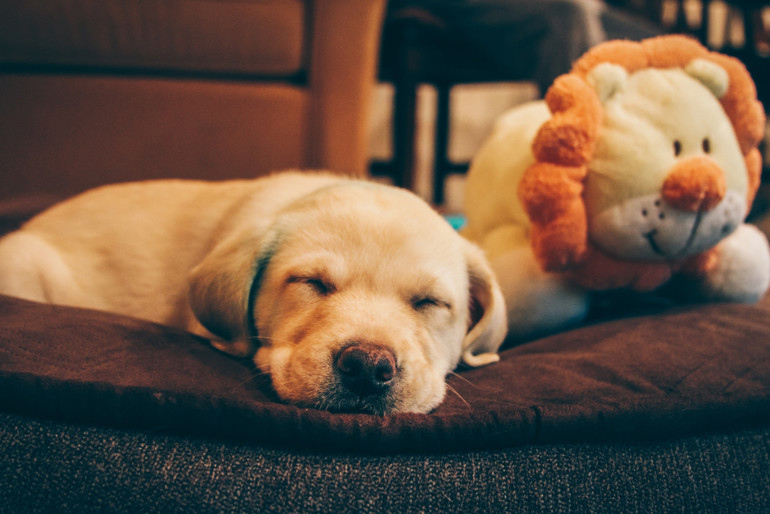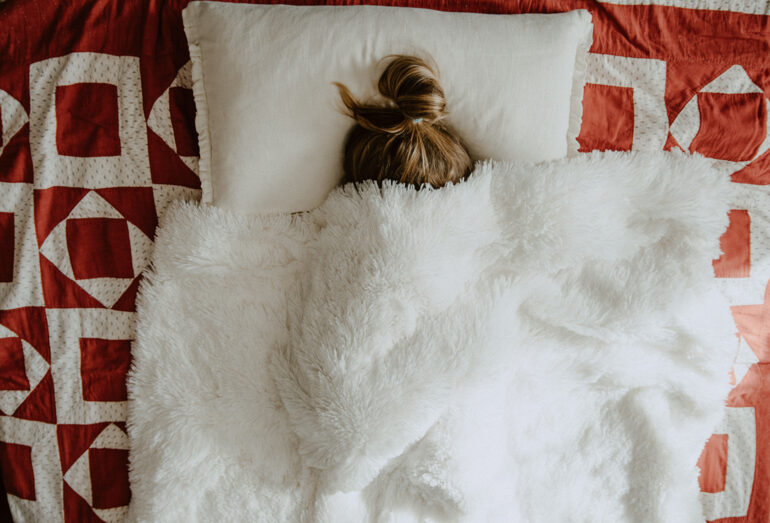In good times, getting a solid eight hours of shut-eye every night can be a struggle for many people—even if you follow all of the “clean sleep” commandments like keeping your bedroom cool and dark and going to bed at the same time every night. Now, as the global coronavirus pandemic persists, sleep has become more elusive than ever and yet those high-quality ZZZs are a front-line defense for your immune system.
“Multiple studies have confirmed a lack of sleep wreaks havoc on our immune system and reduces the body’s ability to fight infections,” says sleep expert Dr. Kent Smith, the founding director of Sleep Dallas, a dental sleep medicine practice and president of the American Sleep and Breathing Academy. “With the coronavirus pandemic, we need to be even more diligent about doing everything we can to achieve quality sleep each night.”
But how exactly can we calm our minds enough to get high-quality sleep while we’re in the throes of a pandemic? We asked experts to first explain why anxiety makes it so hard to achieve sleep and what’s coursing through us that causes all that tossing and turning and those 2 a.m. wake-ups? Then, we gathered their best tips for how to sleep, despite all the stressors introduced by the novel coronavirus.

How anxiety affects sleep
It’s no surprise that stress and anxiety are the culprit of restless nights recently. About a quarter of the nearly 1,000 people surveyed by sleep resource site SleepHelp.org said their sleep quality has already worsened because of Covid-19.
Smith explains we’re facing a long list of stressors that can keep us up at night: the threat of illness; social isolation; a tanking stock market; potential job loss; a scarcity of resources, everything from toilet paper to eggs; and the triple duty of homeschooling, parenting and working from home.
When people experience stress or anxiety, it translates to an increase in adrenaline levels, explains Michael E. Platt, M.D., the author of “Adrenaline Dominance.”
“Excess adrenaline is the number-one cause of sleep issues,” Platt says. “It causes repeated awakening during the night. It causes the mind to race, it causes tossing and turning, it causes teeth grinding and jaw clenching.”
From an evolutionary perspective, we are on high alert whenever there is a perceived threat present, says Amanda Seavey, Ph.D., a licensed psychologist and founder of Clarity Psychological Wellness in Raleigh, North Carolina.
“This often translates into lighter and more broken sleep during times of high stress or anxiety,” she says.
Combined—the pandemic and resulting lockdowns and social isolation—are a perfect storm for sleep disruption, says Dr. Sanam Hafeez, a neuropsychologist in New York City and faculty member at Columbia University.
“We have a harder time shutting down because we are off our regular schedules, we have very little sunlight in our days if we don’t have a backyard or a balcony, and we are fearing the worst,” she says.
Compounding all of this, the habits we typically employ to try and comfort or distract ourselves could be disrupting sleep as well, says Houston Methodist neurologist and sleep expert Dr. Randall Wright. That Netflix binge will likely keep you up later than intended. And the cocktail or glasses of wine you’re enjoying at night may help you fall asleep quicker, but alcohol ends up blocking REM sleep and you wake up within a few hours.

Expert Tips for Better Sleep:
Understanding why the coronavirus is so disruptive to our sleep can help us make key changes. Maybe that means chamomile tea is your new nightcap, Wright says, or perhaps you need to set some firm boundaries on technology.
Here, experts share eight tips that can help you get a better night’s rest, specifically addressing the stressors caused by Covid-19.
1. Help your sleep-wake cycle by spending time outside
When it’s dark at night, your eyes communicate to the hypothalamus that it’s time to feel tired, according to the National Sleep Foundation. Your brain then sends a signal to your body to release melatonin, which makes you feel tired. Being indoors all day during a quarantine doesn’t give your body the cues it needs to stay on track with its circadian rhythm, explains Jason Piper, a certified sleep science coach and founder of Build Better Sleep. To resolve this, get outside shortly after waking up, even if it’s just for a five-minute walk, he suggests. If you can, get outside again between 8 a.m. and noon. “The more time spent outside during this period, the more melatonin your body can make at night,” he says. As the sun sets, dim the lights in your house. He suggests candles because they give off colors similar to a sunset.
2. Take a hot bath 90 minutes before bed
Taking a hot bath before bed could be doubly beneficial. Not only does it help you relax, but the water’s hot temperature changes your body’s core temperature so that you go to bed with a lower temperature, explains Dr. Heather A. Hausenblas, Ph.D., and professor in the Brooks Rehabilitation College of Healthcare Sciences at Jacksonville University in Florida. A drop in temperature helps signal to the body that it’s time for bed, she explains. To really get this right, take your bath about 90 minutes before bed and get your water temp between 104 to 109 degrees Fahrenheit, Hausenblas says. She also suggests adding Epsom salts so you get the relaxation benefits of magnesium.
3. Schedule time in your day to worry
This might sound counterintuitive, but Seavey explains, scheduling time to worry helps us be more mindful and intentional with our worrying. “This helps us let go of the worry when it isn’t worry time, like in the middle of the night,” she says.
4. Don’t work in your bedroom
If you’re adjusting to a work-from-home schedule, be sure you’re not working in your bedroom or scrolling through emails on your phone while you’re in bed. Your bedroom should be a relaxation sanctuary, says Dr. Nancy Irwin, a Los Angeles-based clinical psychologist. Create a soothing energy by keeping your bedroom neat and tidy. Add a white noise machine to block out sounds. “When you walk in your bedroom, you should say: ‘Ahhh,’” she says. “Bedrooms are for sleep, sex and intimacy.”
5. Give your devices a curfew
Now that you’re hunkered down at home, you might be tempted to leave the TV on during the day, says Roy Raymann, Ph.D., Chief Scientific Officer at SleepScore Labs. But an around-the-clock news cycle about the pandemic can easily cause stress, especially as more cases of Covid-19 are reported. Set some rules for yourself surrounding news consumption so that you’re staying informed and getting the information you need, but not constantly reading or watching updates, he suggests. Raymann recommends checking in on information about the outbreak twice a day, but wind down and divert your thoughts in the hours leading up to bedtime.
Another reason to give your tech devices a curfew? Your TVs, phones, computers and tablets emit a blue light that throws off your circadian rhythm, Smith says. Power down a few hours before bedtime and find a wireless way to read or journal, he suggests.
6. Avoid your quarantine snacks before bed
The kitchen may be stocked with quarantine snacks. But you’ll want to be careful of what you eat a couple hours before bed because late-night snacking on cookies, chips, crackers and other foods with refined sugars or carbs can spike your insulin levels and cause sleep disruption, says Dr. Nancy Irwin, a Los Angeles-based clinical psychologist. Here are the best (and worst) foods for sleep.
7. Hide your alarm clock
If you need to, drape a scarf over your clock, Irwin says. That way you don’t become more anxious if you wake up and see it’s 2 a.m. and you become worried about falling back to sleep.
8. Practice gratitude
Instead of scrolling social media before bed, try this trick: List three good things from your day, suggests Dr. Sujay Kansagra, M.D., Mattress Firm’s sleep health expert and an associate professor at Duke University’s Pediatric Neurology Sleep Medicine Program. It can be simple, whether it was a delicious dinner you made or the nice conversation you had with a friend or family member on FaceTime.
More from Better:
Dating While Social Distancing: Why COVID-19 Isn’t Stopping Those Looking For Love
Take a Break from Screens with These Stress-Relieving Activities
Want even more sleep tips from Better? Check out our Ultimate Guide to Better Sleep.
 Brittany Anas is a freelance writer who specializes in health, fitness and travel writing. She also contributes to Men’s Journal, Women’s Health, Trip Savvy, Simplemost, Orbitz, and Eat This, Not That! She spent a decade working at daily newspapers, including The Denver Post and the Daily Camera in Boulder, Colorado, and she is a former federal background investigator. In her free time, Brittany enjoys hiking with her gremlin-pot belly pig mix that the rescue described as a “Boston Terrier” and coaching youth basketball. She also works with domestic abuse survivors, helping them regain financial stability through career coaching. Follow her on Twitter and Instagram.
Brittany Anas is a freelance writer who specializes in health, fitness and travel writing. She also contributes to Men’s Journal, Women’s Health, Trip Savvy, Simplemost, Orbitz, and Eat This, Not That! She spent a decade working at daily newspapers, including The Denver Post and the Daily Camera in Boulder, Colorado, and she is a former federal background investigator. In her free time, Brittany enjoys hiking with her gremlin-pot belly pig mix that the rescue described as a “Boston Terrier” and coaching youth basketball. She also works with domestic abuse survivors, helping them regain financial stability through career coaching. Follow her on Twitter and Instagram.

